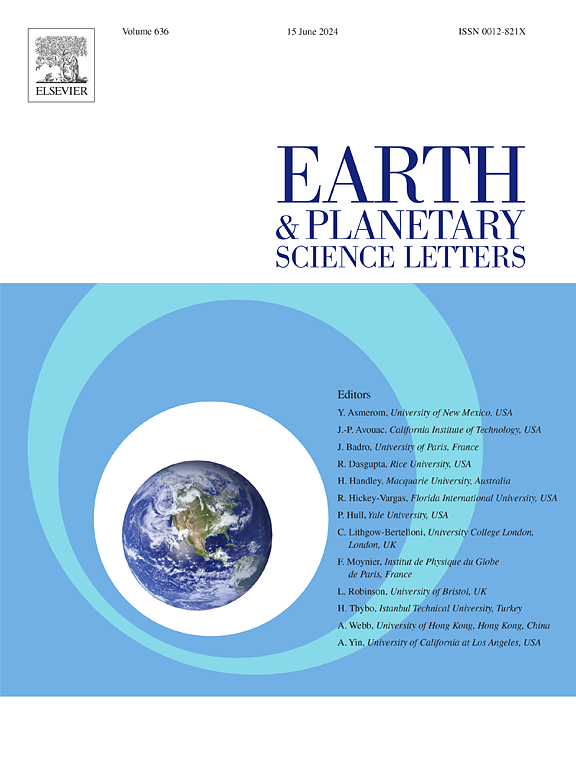从沃尔维斯海脊-里奥格兰德海隆沿线的热点熔体生成率揭示地幔羽流-中洋脊的相互作用
IF 4.8
1区 地球科学
Q1 GEOCHEMISTRY & GEOPHYSICS
引用次数: 0
摘要
地幔羽流与大洋中脊(MOR)的相互作用对地质过程有着深远的影响,如大型火成岩群的喷发、大洋中脊的跃升和流向大洋中脊的羽流。沃尔维斯海脊和格兰德河海隆是研究这些相互作用的绝佳机会,因为它们有相互作用期间和之后阶段的记录。我们估算了沃尔维斯海脊-格兰德河隆起沿线的热点熔体生成率。我们的研究结果如下(1) 羽流-MOR相互作用期间的热点熔体生成率是相互作用后的七倍,这主要是因为羽流上方的岩石圈覆盖层较薄,减压熔化作用较大,有利于熔体穿过岩石圈地幔上升到地壳。(2) 特里斯坦-戈夫火山羽流的减弱表现为熔体生成率下降和火山间距增大。(3) 盖奥特省西侧的线状海脊可能是岩石圈下的地幔羽流从热点流向大西洋中脊的结果。(4) 断裂带提高了热点熔体的生成率。本文章由计算机程序翻译,如有差异,请以英文原文为准。
Mantle plume – mid ocean ridge interactions revealed from hotspot melt production rate along the Walvis Ridge-Rio Grande Rise
Mantle plume and mid-ocean ridge (MOR) interactions have a profound impact on geological processes, such as large igneous province eruptions, mid-ocean ridge jumps and plume flow towards the MOR. The Walvis Ridge and Rio Grande Rise provide an excellent opportunity to study these interactions, as they have a record of during- and post-interaction stages. We have estimated the hotspot melt production rate along the Walvis Ridge - Rio Grande Rise. Our findings are as follows: (1) The hotspot melt production rate during plume-MOR interaction is seven times higher than that after the interaction, primarily because a thinner lithospheric coverage over the plume allows for greater decompression melting and facilitates the ascent of melt through the lithospheric mantle to accrete to the crust. (2) The waning of the Tristan-Gough plume is indicated by a decreasing melt production rate and an increase in inter-volcano spacing. (3) The linear ridges on the western side of the Guyot Province likely result from mantle plume flow beneath the lithosphere from the hotspot to the Mid-Atlantic Ridge. (4) Fracture zones enhance hotspot melt production rates.
求助全文
通过发布文献求助,成功后即可免费获取论文全文。
去求助
来源期刊

Earth and Planetary Science Letters
地学-地球化学与地球物理
CiteScore
10.30
自引率
5.70%
发文量
475
审稿时长
2.8 months
期刊介绍:
Earth and Planetary Science Letters (EPSL) is a leading journal for researchers across the entire Earth and planetary sciences community. It publishes concise, exciting, high-impact articles ("Letters") of broad interest. Its focus is on physical and chemical processes, the evolution and general properties of the Earth and planets - from their deep interiors to their atmospheres. EPSL also includes a Frontiers section, featuring invited high-profile synthesis articles by leading experts on timely topics to bring cutting-edge research to the wider community.
 求助内容:
求助内容: 应助结果提醒方式:
应助结果提醒方式:


